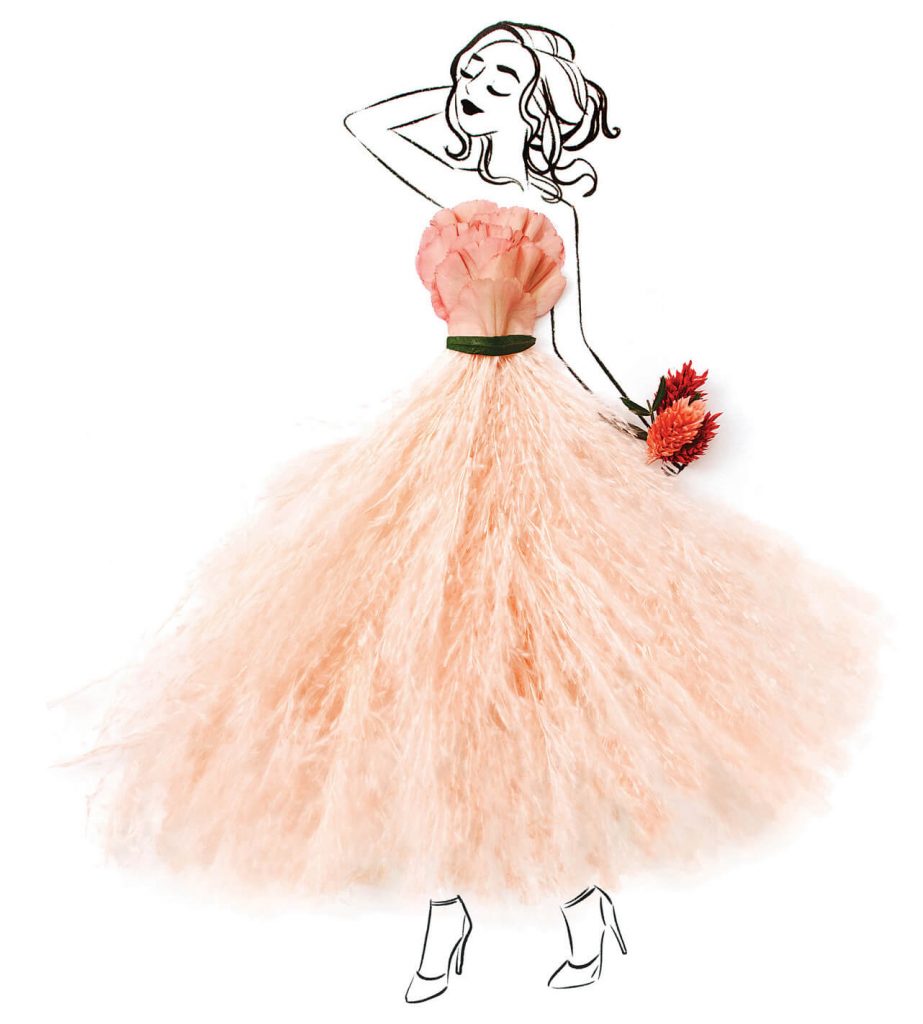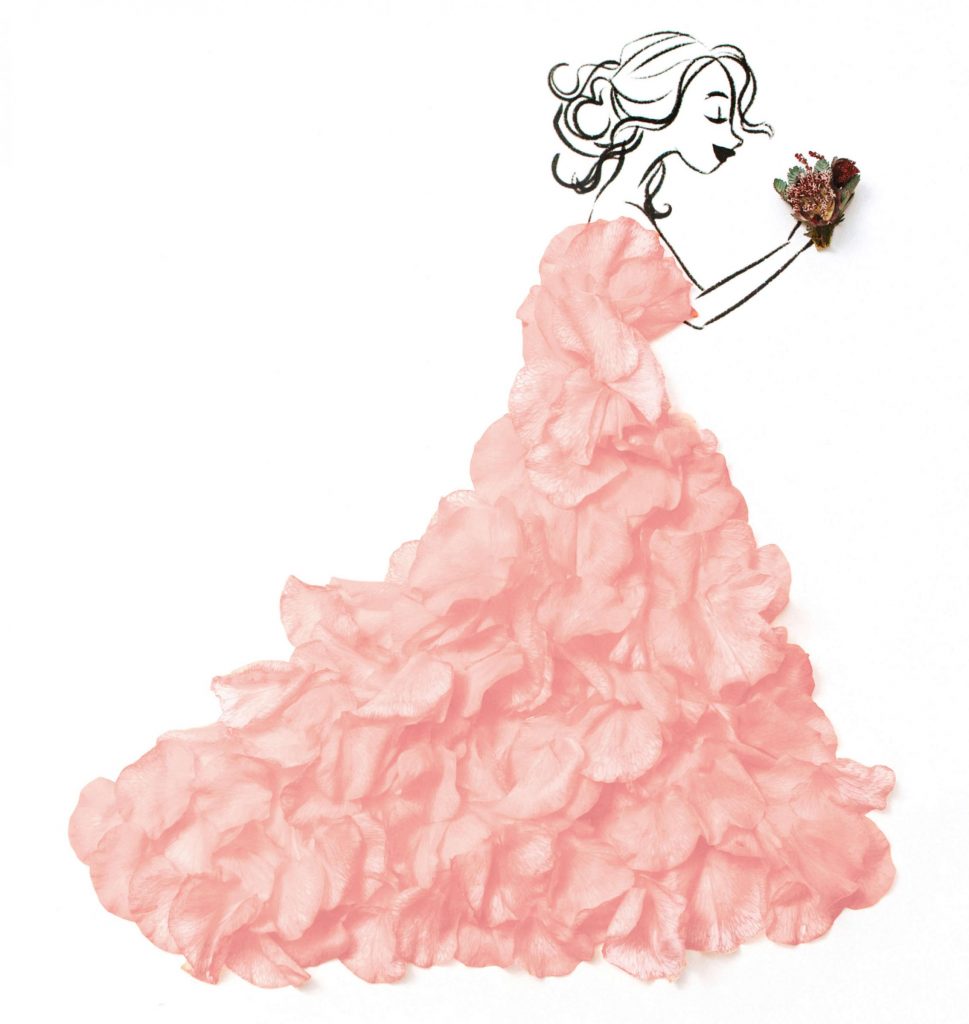
Once you’ve found your soulmate and marriage has been proposed, it’s time to get down to the nitty-gritty of planning your wedding. There are likely several misconceptions that have already been cemented in your brain by well-meaning aunties, too much time scrolling through Pinterest, and outdated ideas gleaned from a lifetime of sappy wedding movies.
But society has changed dramatically since the days when fathers literally “gave away” their daughters. Couples no longer feel bound to plodding through a rote script of how the day should go, rethinking outdated ideas such as the garter and bouquet toss or that brides must wear white and cake must be served. Weddings can be as varied and modern as the couples who choose to join their lives together—often bucking tradition in an effort to infuse the event with their own personalities.
“We’re always changing—we kind of get rid of what doesn’t work for us, and we adopt and absorb what is working,” says Lizzie Post, who works in the family etiquette business founded by her famous great-great-grandmother, Emily Post. Back in the day, says Post, you could only do slight variations on a traditional wedding. “But nowadays, it’s more, ‘Who are you? What are you comfortable with? What has meaning to you? What doesn’t?’” she says.
We spoke with four wedding experts, including Post, about when to keep traditions and when to ditch them, as well as several common myths associated with getting hitched. Here are the top 12 things they think you should know.




Lizzie Post
Co-president, author, and spokesperson, The Emily Post Institute; co-host of Awesome Etiquette podcast
Kawania Wooten
Principal consultant, Howerton+Wooten Events
Heather St. Clair
Owner, Heather St. Clair Events
Kelly Brittingham
Owner, The Wedding Ninja
No. 1: Guests have to “pay” for their plate.
One thing Post hears all the time is this old myth that the price of your gift must equal what it costs for you to attend the wedding. “That is just false,” she says. “You should not know how much that wedding cost. You should not know how much per head it costs, and you only ever base a gift that you give someone—for any occasion—on your own budget and your comfort level with giving that item, and that’s it. Nothing else should dictate it, not even the registry.”
No. 2: Your wedding day is all about you.
Okay, it’s mostly about you—but your guests are very important, too. “We call this the host-guest dance, and you’re trying to find that balance of making people comfortable in your presence and yet still maintaining self-respect,” says Post. “I get the distinct feeling that people have this misconception that it’s their day to the max, and that people should bend over backwards in ways that are completely unfair to ask, like going into debt, or forcing someone to do a speech or a reading when you know they are terrified of public speaking.” She reminds us that etiquette is about more than knowing which fork to use during the salmon course. “Emily Post always said the goal of etiquette was to make others comfortable and to put them at ease.”
No. 3: The bride’s family pays for everything.
Similar to her feelings about gifts, Post balks at the idea that certain parties should be forced into financial responsibility in the name of tradition. “First of all, not all couples are brides and grooms,” she says. “But also, it’s not a tradition that we need to hold on to for any reason. I have a really hard time when we put financial pressures on people from a social obligation standpoint.” Instead, she recommends that couples and anyone who might be contributing to the wedding expenses sit down for a “good, candid, respectful conversation” about the most practical way to handle the financial responsibilities.
No. 4: It’s cheaper to have a wedding at home.
Kawania Wooten recalls a small wedding she helped plan where the couple decided to get married at a grandparents’ home, thinking it would be a cost-saver. But she suspects they ended up spending more money when all was said and done. A home cannot compete with a hotel’s resources, says Wooten. “You bring everything in for a home wedding, and before you know it, you’re spending money on things you never would have thought about.” Even beyond the obvious items such as tables, chairs, and tents, you might end up renting portable bathrooms because your plumbing can’t handle all those people using your facilities. “If you add in your 50 guests, then you add vendors—you’re doing a number on your house.”
No. 5 Girls on one side, boys on the other.
For decades, couples would follow this predictable wedding party recipe, with typical wedding photos showing a tidy lineup of women in matching dresses flanking the bride and men in tuxes on the other side, next to the groom where they belong. Nowadays, however, you’re much more likely to see couples challenging these (thankfully) antiquated ideas of gender. “A lot of our wedding parties are mixed-sex now,” says Wooten. “I’m seeing ‘best women’ and ‘honor attendants’ instead of bridesmaids and groomsmen. I think that’s a sign of a healthy couple. That you can let his best female friend stand by his side when you get married speaks a lot about the bride—and vice versa. And people always assume that
if a man is standing by a woman that he’s gay, and that’s not always the case.”
No. 6: DIY will save you money.
Wooten cautions that unless you have a particular skill and know how much labor is actually involved in providing, say, the flowers or the cake—leave it to the professionals. “Weddings are labor-intensive,” she says. “When you take on that labor yourself, and you truly don’t know what goes into it, you’re underestimating how much time it will take. It eats into your time, which eats into the joy that you’re supposed to be experiencing that day.” That goes for asking close friends or family members to work on your wedding, as well. She says she’ll have someone say that his or her mom is a great baker and will do the cake. “Don’t do that to your mom,” she tells clients. “She’s going to be working all the way up to the wedding. The only time I would let a mother bake a cake is if she owned a bakery and her staff was baking the cake, not her.”
No. 7: Weddings have to be on a Saturday.
Heather St. Clair recalls one Sunday wedding where the couple organized a softball game at Patterson Park the day before and then had a big picnic in the park with guests afterward. “I think it relaxes your nerves a little bit when you get to see everybody before you walk down the aisle, so that can be a really big benefit to doing a Sunday wedding,” she says. St. Clair thinks Fridays are a fun option because “people love an excuse to take a half day off of work if they need to travel,” and a late reception adds to the party vibe. “And then again, you have the whole weekend to celebrate with your guests from out of town, and that can be in a more relaxed way, too, because you’ve gotten through the main event, all the nerves have been worked out, and you can really just enjoy each other.”
No. 8: The wedding industry is a rip-off.
St. Clair bristles when she hears her industry referred to as the “wedding industrial complex.” Of course, there are bigger businesses involved in the industry, but she points out that it’s usually small, local businesses helping you with your big day. “It’s a lot of women, and it’s a lot of minorities who have wedding businesses,” she says. “When you’re planning a wedding, you’re really supporting a large network of small businesses. And sometimes, if you have your wedding at a museum, that money is going toward their programming.” Plus, St. Clair agrees with her counterparts that it’s really the labor and expertise that drive up the price of wedding services—not greed. “I always tell people when they’re looking at those price tags for catering or their venues and photographers, you can actually feel really good about the money that you’re spending.”

No. 9: The bride has to wear white.
St. Clair says that more than ever, today’s brides are applying the same individuality you see in other aspects of wedding trends to perhaps the most sacred bridal tradition: the white gown. “The bride definitely does not have to wear white,” she says. “I’ve seen some beautiful gowns in different colors—even black. Whatever she feels good in on the day of.” St. Clair says the breaking of this tradition is less common, but that marriage equality and an increasing awareness of gender nonconforming people has inevitably led to wedding professionals, couples, and their families rethinking the traditional stereotype of what feels bridal. “There shouldn’t be any pressure that you have to wear a white gown on your wedding day.”
No. 10: Your wedding has to be big.
Budget concerns aren’t the only reason you might want to scale back from a guest list of 250. Other factors include family dynamics and whether a couple is prepared to absorb the stress of planning a huge affair. “It’s very stressful when you’re planning a wedding having to think about all these people,” says Kelly Brittingham. In the name of streamlining and simplifying, she says removing distant relatives is a good place to start. “A lot of times these aren’t people that you see every day. You don’t know what their current situations are or what they would think is fun,” she says. That said, she says sometimes it’s best to consider leaving even close relatives off the list if it keeps you sane. “I actually had a wedding where the parents of a bride did not attend,” she says. “They just weren’t getting along, and I kind of broke it down for her and said, ‘You know, your dad doesn’t have to walk you down the aisle if that’s not what makes you happy.’”
No. 11: Catering shouldn’t be so expensive.
Brittingham says she often hears, “Oh, my god, $65 per person. I would never pay that in a restaurant!” But she says comparing a catered dinner to a meal at a restaurant is the wrong analogy. “You’ve got to think of them bringing the restaurant to you. There are so many other things involved when hiring a caterer for a wedding—bartenders, bussers, waiters, so I think it’s good to go in with the expectation that it’s going to be more than eating at a restaurant.” Instead of balking at the price and trying to go lower, it’s better to trim your guest list to make your big day more manageable—advice that also works for this next misconception.
No. 12: You must follow the script.
This is a sentiment echoed by all of our experts: Gone are the days of a strict wedding schedule that ushers the crowd from ceremony to first dance to cake-cutting to a birdseed-throwing exit. “Especially here in Baltimore—we’re kind of a quirky city,” says Brittingham. She points out that many of the traditions that have fallen by the wayside have been those that feel quaint, at best, and offensive, at worst, for modern women, such as “giving away the bride,” bouquet tosses, and the whole garter rigmarole. “These traditions, you don’t have to follow them unless they mean something to you,” she says. “So you can really customize your own wedding, and you shouldn’t have to be chained down to these ideas of what a wedding should be.” Don’t want a sit-down dinner? Pass heavy hors d’oeuvres. Don’t want to be hampered by that frothy dress all night? Change into a white pantsuit after the ceremony. Don’t want a first dance? Skip it. “Whatever you think is fun, let’s make it happen.”